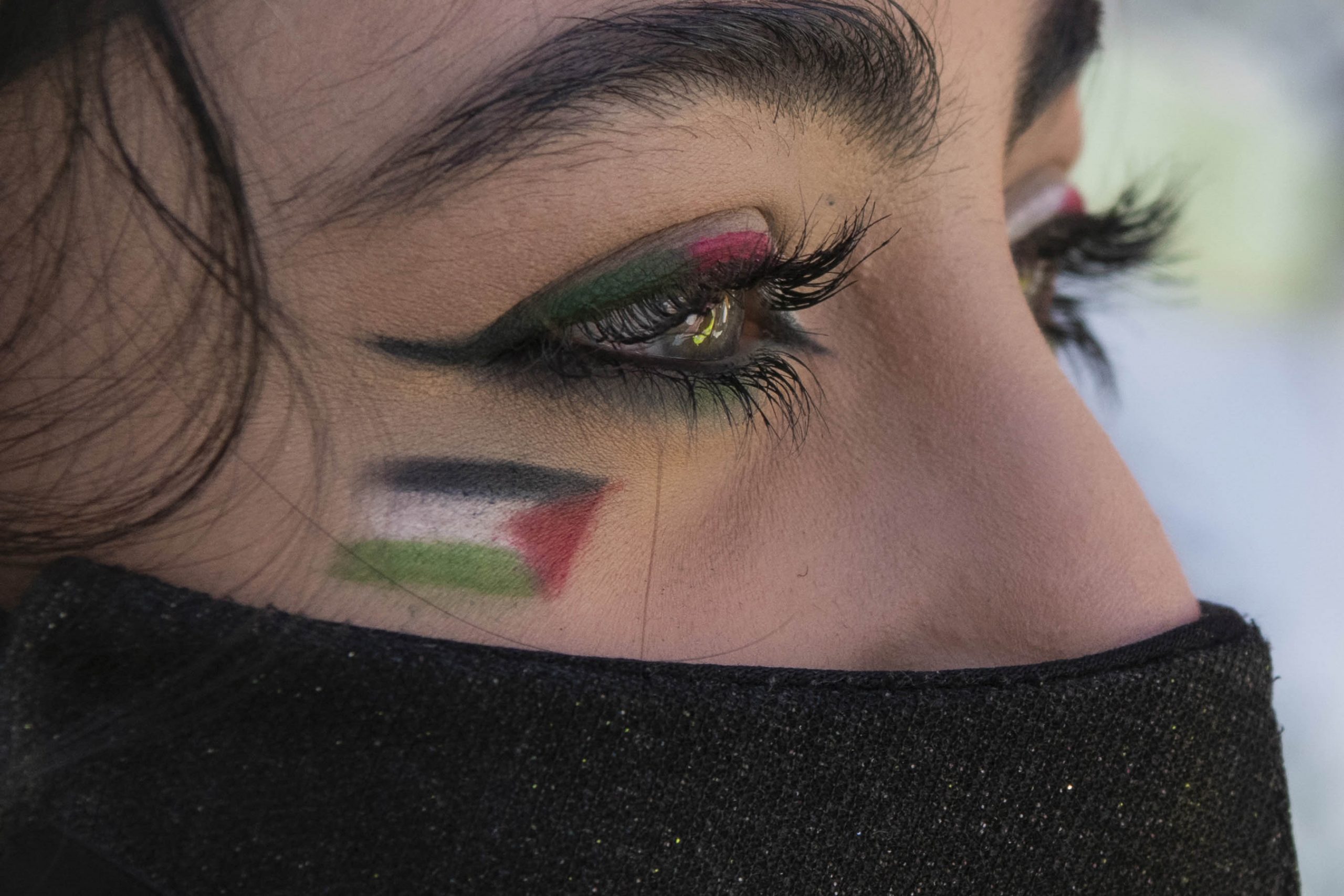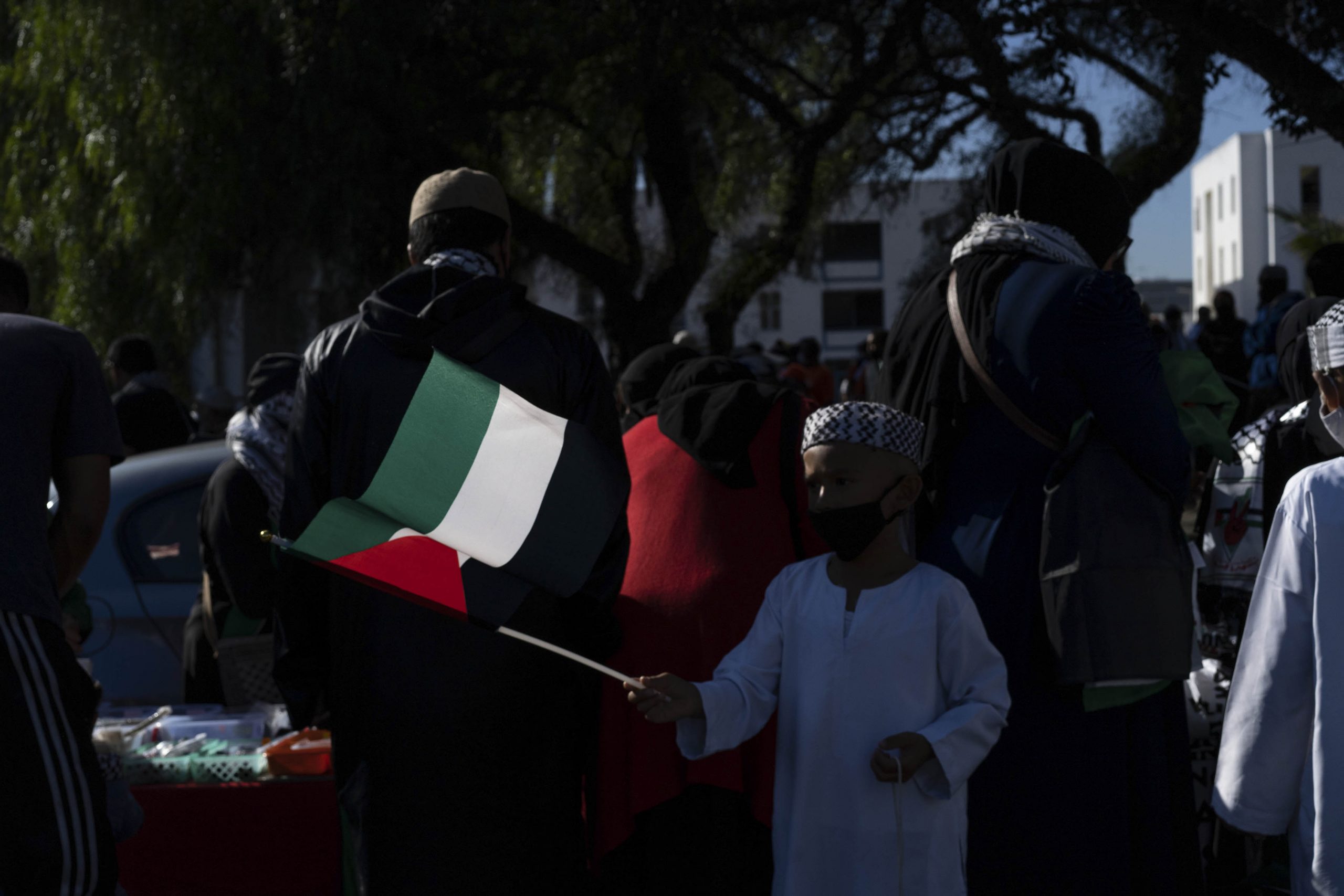ANC government must impose sanctions on Israel
Condemning Israel while continuing to do business with the state is a cynical attempt to spin optics when what Palestinians need is decisive action.
Author:
14 May 2021

When it comes to Palestine, statements of condemnation are no longer worth the paper they are written on. Israel has used F-16 fighter jets to bomb high-rise apartment blocks, as it did to the Al Jandi Tower in the Gaza Strip, and shot and tear-gassed Palestinians praying in the Al Aqsa Mosque in the final week of Ramadan. On the night of May 13, Israeli war planes carried out an “unprecedented” bombing campaign on Gaza. The government of Israel is rejecting all offers of mediation to reach a ceasefire. It is clear, then, that condemnation not backed by material force is unable to prevent Israeli war crimes, or to offer even the most basic forms of protection to Palestinians.
The Israeli state continues to be awarded a significant degree of impunity by a declining but still powerful Euro-America global hegemony. At the same time, it wields a military backed with billions of dollars received each year from the government of the United States. This combination of impunity and extraordinary military force has produced an appalling system of oppression that needs to be confronted head-on.
The Palestinian-led Boycott, Divestment and Sanctions (BDS) campaign, inspired by key tactics adopted by the international popular opposition to apartheid, is now 16 years old. It offers a practical route towards building international solidarity with Palestinians and opposition to the Israeli state. However, the governments of the world have largely refused to participate in the sanctions component of the campaign. Some municipalities, mainly in Europe, have acceded to pressure from BDS groups to divest from companies that do business with Israel, such as French water, waste and transport company Veolia. Some supermarkets have stopped stocking Israeli goods. But national governments are yet to ban all trade between their public and private sectors with the state of Israel or Israeli companies.

According to the Israeli Trade Mission to South Africa, our country imports R3.4 billion worth of Israeli goods and services each year, much of which is computer software, chemicals and electrical items. The two countries also have ties in agriculture, co-hosting a roadshow in South Africa last year that showcased Israeli smart-agriculture technologies.
When apartheid South Africa was isolated internationally, there were close links between the South African and Israeli states. Mining house De Beers exported rough diamonds worth billions of rands to Israel for cutting, polishing and export to the rest of the world. Israel lost much of the world’s diamond beneficiation trade only when India set up lower-cost cutting and polishing factories.
However, Israel adapted fast, becoming what Israeli diamond dealers Benny and Yossi Meirov describe as “simply the international broker” for diamonds from South Africa, Russia and India. The diamond business between South Africa and Israel continues. The South African Diamond Corporation (Safdico) has an office in Israel and South African company Trans Atlantic Gems Sales recently helped the sale in Dubai of hundreds of millions of rands worth of rough diamonds to almost 50 Israeli companies, among others. “You will see traders from Israel coming to Dubai to buy diamonds in droves,” David Zabinsky, the chief executive of Dubai diamond corporation Trigem, told the industry press.
Israel is also marketing its expertise in cyber security globally and shamelessly sells security equipment to other countries, some of which is used to repress protests elsewhere in the world, including the US. This was one of the issues that led to mutual affirmations of solidarity between the Black Lives Matter movement and the Palestinian struggle.
South Africa’s veteran anti-arms deal campaigner, Terry Crawford-Browne, wrote in February that Israel is one of the top 10 global arms exporters. “Arms imports [to South Africa] from Israel since 2000 have been radar systems and aircraft pods for the arms deal BAE/Saab Gripens, riot vehicles and cyber security services. Unfortunately, the monetary values are not given. We should also remember that the semi-automatic G3 rifles used by the South African Police [Service] in the 2012 Marikana massacre were manufactured by Denel under licence from Israel”.

Good for the goose
There is currently no impediment to the ANC government instituting sanctions against Israel to end this trade. Such sanctions would pressure other southern African countries such as Angola and Botswana to end their diamond, and other trade, with Israel. But the ANC, which won huge international support during its period of exile, simply ignores the urgent moral imperative to contribute to ending apartheid in Israel. Sending leaders and ordinary members to attend protests in support for Palestine is a politically meaningless gesture designed to pacify sentiment rather than exert real pressure on the Israeli state.
The ANC government has refused to sever diplomatic ties with Israel and has not shown any sign of being willing to agree to the Media Review Network advocacy group’s request to “lift a visa ban on Palestinians and slap it on Israelis” (referring to the fact that Israeli citizens do not need a visa to visit South Africa, but Palestinians do).
Apart from having to apply for visas and the delay that the lengthy process entails, Palestinians have extra burdens that do not apply to Israelis. They have to provide proof of medical insurance, a hotel booking and sufficient funds for their stay. There are a host of restrictions that apply to Palestinians but not to Israelis, yet we are led to believe that South Africa opposes Israel’s brutal military occupation of Palestine.
With the permission of the ANC government, the Israeli secret service has been operating its interrogation room at OR Tambo airport for decades. Here, almost every Palestine solidarity activist, trade unionist or pro-Palestinian academic travelling to Palestine for the past 20 years has been grilled about their political views, even strip-searched, before being allowed – or not – to travel to Palestine.
War crimes
Many Israeli war crimes have been committed in Palestine in the first weeks of May, including the murder of nine Palestinian children from the same extended family. Israel has bombed government offices and apartment blocks in the Gaza Strip for several days, killing scores of Palestinians including children and a man preparing for his wedding, the Al Jazeera news network reported. The death toll in Gaza as of the morning of May 14 stood at 115 killed, including 27 children and 11 women, and more than 600 wounded. More bodies remain trapped under the rubble. Earlier in the week, an Israeli attack by F-16 fighter jets on a Gaza refugee camp killed three people, including a mother and her disabled child. One of the dead was Mohammed Nusair, who had been awaiting the birth of his child, born just hours after Nusair was killed by an Israeli missile.
Israeli soldiers have invaded villages in the West Bank and hauled young men off to prison. The Israeli military storming of the Al Aqsa Mosque in Jerusalem, one of the holiest sites in Islam, was not merely an unconscionable desecration. It resulted in more than 520 Palestinians injured in Jerusalem, another 200 in the West Bank, and the injury and arrest of 37 Palestinian children, Unicef reported. At the time of writing, Palestinian action, including rockets fired into Israel, had killed seven Israelis.
These and other instances of Israeli brutality towards Palestinians in Jerusalem have been misrepresented by the mainstream media, and South Africa’s Department of International Relations and Cooperation (Dirco), as “clashes”.
Earlier this week Gaza-based academic Haidar Eid said, “Apartheid Israel wants us to accept our slave status and say thank you! That is not going to happen because we have taught the world the meaning of sumud (steadfastness).” Repeated violent attempts by Israeli settlers to evict Palestinian families from their homes in the Jerusalem neighbourhood of Sheik Jarrah and the invasion of the Al Aqsa Mosque have drawn a red line for Palestinians from Jerusalem, Gaza and the West Bank. That red line being a Palestinian cultural concept meaning a boundary that can never be breached, under any circumstances.
Related article:
The Israeli government relies heavily on Israeli settlers, typically armed with machine guns and dogs, to invade and occupy individual Palestinian homes and communities in the cities of Jerusalem and Hebron. An ordinary Palestinian family has no chance against these mobs and is often forced to vacate in minutes the home they and their ancestors have lived in for decades.
After a settler occupation, activists from the International Solidarity Movement and the Ecumenical Accompaniment Programme in Palestine and Israel have for years had to escort children as young as six to school through the streets of these old cities. Israeli settlers in the occupied apartments throw bricks at the children, making the streets dangerous places. It serves Israel’s interests for settlers, rather than soldiers, to be seen to be carrying out these illegal acts independently.
But as we have seen in the second week of May, the presence of tens of thousands of unarmed Palestinians effectively deters the settlers and even stymies the enormous power of the Israeli military.
Hypocritical posturing
An estimated 90 000 unarmed Palestinians marched to protect the Al Aqsa Mosque and Jerusalem. The “1948 Palestinians” living in Israel, sometimes wrongly referred to as “Israeli Arabs”, have protested in their towns and cities, too.
This resistance comes at a heavy cost. Several Palestinians lost their eyes when they were shot out by Israeli soldiers. During Palestinian protests in 2003 against the huge concrete wall built by Israel, it was common to see dozens of young Palestinian men in wheelchairs taking part. In the main, they had been left disabled three years before, when the second Intifada began, by Israeli soldiers who deliberately shot at their spines while they took part in peaceful demonstrations. The number of these devastating injuries was so high that one West Bank village, Bili’in, hosted a march – led by young people in wheelchairs – against what activists have dubbed the “apartheid wall”.
It is unthinkable that we should sit back and allow the numbers of dead Palestinians and those with life-altering injuries to rise. It is imperative that the ANC impose full and comprehensive sanctions, including a military embargo, against Israel.
Dirco has responded to the current escalation of repression by “condemning” Israel while making absurd calls for a two-state solution that would leave millions of Palestinians in exile, and which has not been possible for the past 20 years since Israel began cutting the West Bank into tiny separated bantustans with its grim architecture of oppression, including the giant wall that deforms the landscape, and people’s lives.
The only way out of this quagmire is to isolate Israel and to sustain that isolation until a secular, democratic state is established for all Israeli and Palestinian citizens, including Palestinian exiles, regardless of race, religion and ethnicity. The hypocritical and opportunist posturing of the ANC government, which turns a blind eye to Israel’s atrocities while sending small numbers of members to protest with the Palestine solidarity movement, must be rejected with the contempt it deserves.






